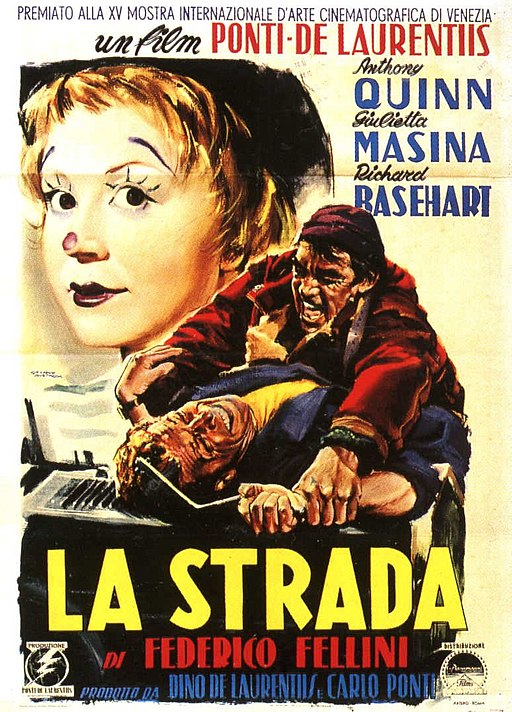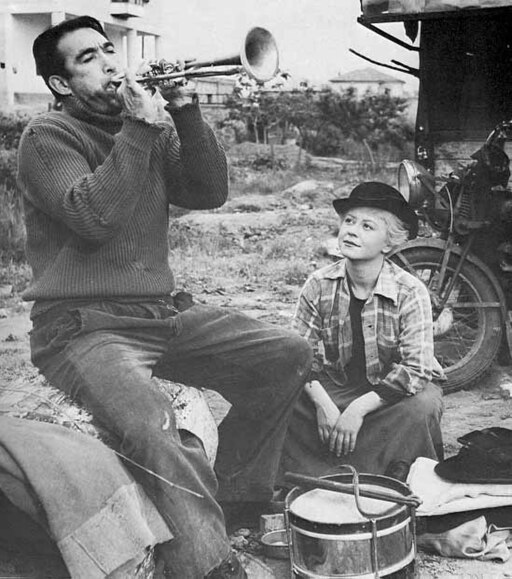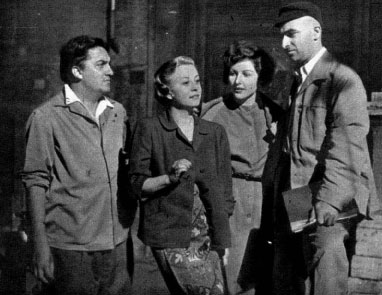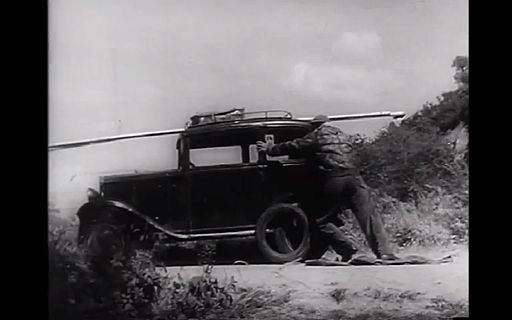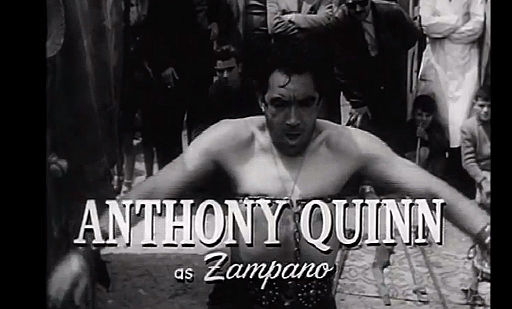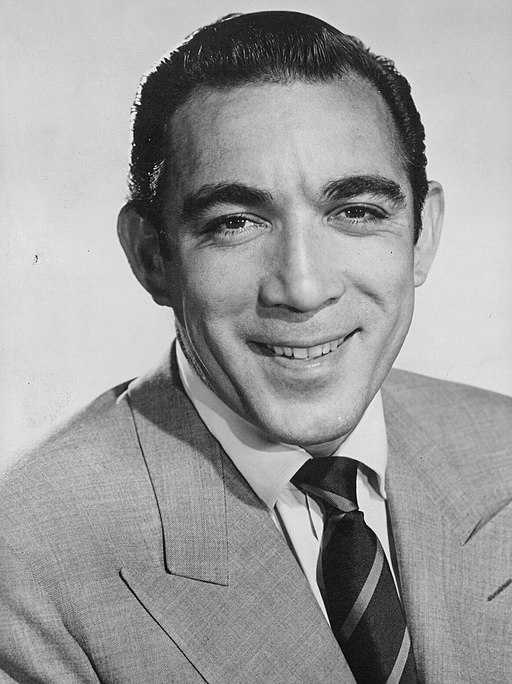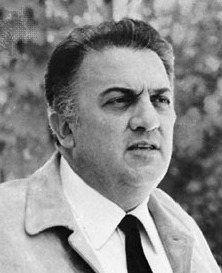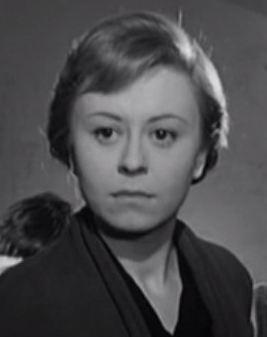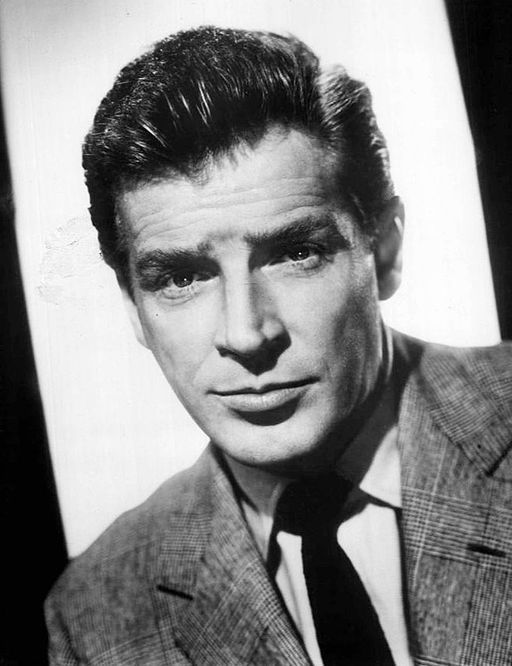La Strada - 1954
back| Released by | Ponti-De Laurentiis Cinematografica |
| Director | Federico Fellini |
| Producer | Dino De Laurentiis, Carlo Ponti |
| Script | Federico Fellini, Tullio Pinelli, Ennio Flaiano |
| Cinematography | Otello Martelli |
| Music by | Nino Rota |
| Running time | 108 minutes |
| Film budget | Not published but extremely low budget |
| Box office sales | All-time sales are around $ 62 million |
| Main cast | Anthony Quinn - Giulietta Masina - Richard Basehart - Aldo Silvani |
La Strada
Iconic Movie on Human Connection and Despair
La Strada" is celebrated for its poignant storytelling and beautiful cinematography, and it has left a lasting impact on the world of cinema. It won the inaugural Academy Award for Best Foreign Language Film in 1956.
The film's exploration of complex human emotions and relationships, set against the backdrop of post-war Italy, has made it a classic of world cinema.
Related
La Strada – 1954
Summary and Overview
"La Strada" is a 1954 Italian drama film directed by Federico Fellini, which delves deep into themes of human nature, freedom, and bondage, set against the backdrop of post-war Italy.
Summary:
The Characters and Setting:
- Zampanò: A brutish, itinerant strongman who travels the countryside performing a strongman act.
- Gelsomina: A naive and innocent young woman sold by her mother to Zampanò to be his assistant.
- Il Matto (The Fool): A high-wire artist and clown who crosses paths with Zampanò and Gelsomina, offering a stark contrast to Zampanò's personality.
The story takes place in a bleak, post-war Italy, where poverty and struggle are prevalent.
The Journey Begins:
- Gelsomina is sold to Zampanò to assist him in his traveling show. Despite her initial reluctance, she adapts to life on the road, learning to play the snare drum and trumpet.
- Zampanò treats Gelsomina poorly, often being abusive and indifferent to her needs and feelings.
Encounters with Il Matto:
- Gelsomina and Zampanò encounter Il Matto, who teases Zampanò, igniting a rivalry.
- Il Matto’s playful and carefree nature captivates Gelsomina, offering her a glimpse of a different life. He sees the good in her and encourages her to find her own way in life.
Tragedy and Realization:
- Zampanò’s jealousy and rage towards Il Matto escalate, leading to a tragic incident where Zampanò inadvertently kills Il Matto.
- Gelsomina is heartbroken and her spirit is shattered. She becomes despondent and loses her will to live.
The Conclusion:
- Zampanò abandons the now catatonic Gelsomina on the beach. The film ends with Zampanò, drunk and broken, by the seaside, overwhelmed by the realization of his loneliness and the pain he has caused.
Analysis:
Exploration of Human Nature:
- Zampanò represents brute strength and the survival instinct, but he is also a symbol of emotional emptiness and the inability to love or empathize.
- Gelsomina symbolizes innocence and a childlike wonder. Her journey reflects the loss of innocence and the harshness of life.
- Il Matto embodies freedom, joy, and the ability to see beauty in life despite its hardships.
Themes:
- The film explores themes of freedom versus bondage. Gelsomina, despite her physical freedom, is emotionally and psychologically bonded to Zampanò.
- The film questions the meaning of life and one's purpose. This is evident in Gelsomina's existential crisis and her search for meaning.
- The interplay between strength and vulnerability is a recurring theme, portrayed through the interactions between Zampanò and Gelsomina.
Cinematic Techniques:
- Fellini's use of neorealism is evident in the film’s setting and depiction of post-war Italy's societal conditions.
- The cinematography captures the starkness of the landscape, mirroring the emotional barrenness of the characters.
- Nino Rota's musical score adds a poignant layer to the film, enhancing the emotional depth of the narrative.
Legacy:
- "La Strada" is regarded as a masterpiece of world cinema and a seminal work in Fellini’s career. It marks a transition from neorealism to a more personal and poetic cinematic expression.
- The film’s influence extends beyond cinema, impacting literature, theater, and the arts.
In summary, "La Strada" is a poignant exploration of the human condition, showcasing Fellini's extraordinary ability to weave deep emotional narratives with striking visual storytelling. The film's characters, themes, and cinematic style have left an indelible mark on the landscape of world cinema.
Trailer of the Remastered Version of "La Strada":
Full Cast:
- Giulietta Masina as Gelsomina
- Anthony Quinn as Zampanò
- Richard Basehart as The Fool (Il Matto)
- Aldo Silvani as The Circus Owner
- Marcella Rovere as The Widow
- Livia Venturini as The Sister of Il Matto
Analysis of Federico Fellini’s Direction:
Federico Fellini's direction in "La Strada" is a significant turning point in his career, showcasing a unique blend of neorealism and a more personal, poetic style that would become his signature in later works. Here's an analysis of his direction in this film:
Blending Neorealism with Personal Style
Transition from Neorealism:
Fellini started his career in the Italian neorealist tradition, which focused on stories about ordinary people set against the backdrop of social and economic realities. In "La Strada," while there are elements of neorealism, such as the depiction of post-war Italy's poverty and struggle, Fellini begins to infuse more personal and surreal elements into the narrative.
Poetic Realism:
Fellini's approach in "La Strada" is often described as 'poetic realism.' He uses the realistic setting not just to depict a slice of life but to explore deeper, more existential themes. This is evident in the characters' journey, which transcends the physical to become a metaphor for emotional and spiritual odysseys.
Characterization and Emotional Depth
Deeply Flawed, Human Characters:
Fellini's characters in "La Strada" are complex and multi-dimensional. Zampanò, for instance, is not just a brutish strongman but a deeply flawed human being incapable of understanding his emotional barrenness. Gelsomina, with her childlike innocence, evolves throughout the film, reflecting a profound understanding of human nature and its vulnerabilities.
Exploring Human Relationships:
The director delves into the dynamics of human relationships, particularly between Zampanò and Gelsomina. Their relationship, marked by abuse, dependence, and unspoken emotions, serves as a canvas for Fellini to explore themes of love, freedom, and bondage.
Visual and Aesthetic Choices
Cinematography and Visuals:
Fellini and cinematographer Otello Martelli create a visual language that complements the film's emotional tone. The use of landscapes, the play of light and shadow, and the framing of scenes contribute to a sense of melancholy and introspection.
Symbolism:
Fellini employs symbolism to deepen the narrative. For example, the road in "La Strada" symbolizes life's journey, filled with twists, turns, and uncertainties. The characters each represent different responses to life's challenges.
Musical Score
Collaboration with Nino Rota:
The music, composed by Nino Rota, is integral to the film's emotional impact. Fellini's use of music goes beyond mere background, instead playing a crucial role in setting the mood and complementing the narrative.
Impact and Legacy
Influence on Cinema:
"La Strada" marks a pivotal point in Fellini's career, laying the groundwork for his later, more stylistically bold films. The film's combination of realist narrative with a more personal, artistic vision influenced not just Italian cinema but also international filmmakers.
Emotional Resonance:
The emotional depth and resonance of "La Strada" are hallmarks of Fellini's directorial style. He has a unique ability to draw profound emotional responses from the audience, making his films a deeply personal experience.
In summary, Federico Fellini's direction in "La Strada" is a masterful blend of realism and poetic expression. His exploration of human nature, combined with a distinctive visual style and emotional depth, not only defines this film but also sets the stage for his future works, making him one of the most influential filmmakers of the 20th century.
Performance of Giulietta Masina:
Giulietta Masina's portrayal of Gelsomina in Federico Fellini's "La Strada" is a profoundly nuanced and deeply affecting performance that stands as one of the most memorable in cinematic history. Her role is pivotal to the film's emotional depth and thematic exploration.
Characterization of Gelsomina
Innocence and Vulnerability:
Masina brings to life the character of Gelsomina with an extraordinary blend of innocence and vulnerability. Gelsomina is portrayed as a simple-minded, yet deeply perceptive and emotionally rich character. Her wide-eyed naivety, juxtaposed with a resilience and inner strength, forms the core of her character.
Expressive Physicality:
Masina's physical expression in the role is remarkable. Her use of facial expressions, body language, and even small gestures adds layers of meaning to Gelsomina’s character. Her ability to convey a range of emotions, from joy and wonder to profound sadness and despair, without extensive dialogue, showcases her immense talent.
Emotional Journey
Transformation Through Suffering:
Throughout the film, Gelsomina undergoes a significant transformation. From a naive young woman sold into a life of hardship, she evolves into someone who, despite her circumstances, finds moments of joy and beauty. Her journey is one of emotional maturation, shaped by her experiences with Zampanò and Il Matto.
Empathy and Compassion:
Gelsomina's empathy and compassion, portrayed brilliantly by Masina, serve as a stark contrast to Zampanò's brutishness. She represents the possibility of kindness and humanity in a harsh world. Her interactions with other characters reveal a deep capacity for love and understanding.
Symbolic Representation
Symbol of Hope and Purity:
In a film laden with symbolism, Gelsomina stands as a symbol of hope, purity, and the enduring human spirit. Her childlike wonder and ability to find beauty in the mundane provide a poignant commentary on the human condition.
Metaphorical Significance:
Gelsomina’s character can be seen as a metaphor for post-war Italy itself – innocent, damaged, but resilient and enduring, finding ways to smile amidst the rubble.
Masina's Acting Style
Method and Emotional Depth:
Masina's method of acting, deeply rooted in emotional authenticity, allows her to fully inhabit Gelsomina’s character. She brings an emotional depth to the role that resonates with audiences, making Gelsomina a truly empathetic and memorable character.
Legacy of the Performance:
Masina's performance in "La Strada" is often cited as one of the greatest in film history. Her portrayal of Gelsomina has influenced many actors and filmmakers, and her collaboration with Fellini (who was also her husband) is noted for its profound impact on cinema.
In conclusion, Giulietta Masina's performance as Gelsomina is a masterclass in film acting. She infuses the character with a depth of emotion and humanity that is both heartbreaking and inspiring. Masina's Gelsomina is not just the heart of "La Strada" but also a timeless symbol of the enduring human spirit in the face of adversity.
Analysis of Anthony Quinn’s Performance:
Anthony Quinn's portrayal of Zampanò in Federico Fellini's "La Strada" is a powerful and complex performance that brings to life one of the most intriguing characters in cinematic history. His role is crucial to the film's exploration of themes like human nature, brutality, and redemption. Here's an in-depth analysis of his role:
Characterization of Zampanò
Physicality and Brute Force:
Quinn embodies the character of Zampanò with a raw physical presence. His portrayal is marked by a rugged physicality that perfectly captures the essence of a brutish, itinerant strongman. His imposing stature and rough demeanor immediately establish Zampanò as a figure of strength and intimidation.
Emotional Complexity:
Despite his tough exterior, Quinn infuses Zampanò with an undercurrent of emotional complexity. There are fleeting moments where glimpses of vulnerability, regret, and even longing appear beneath his gruff facade. This subtlety in Quinn's performance adds depth to what could have been a one-dimensional character.
The Journey of Zampanò
Internal Conflict:
Zampanò is a man battling internal conflicts. His inability to express emotions or form genuine human connections is a central aspect of his character. Quinn masterfully portrays this inner turmoil, often through minor gestures or changes in expression that hint at Zampanò's repressed feelings.
Relationship with Gelsomina:
The dynamic between Zampanò and Gelsomina is central to the film. Quinn's interactions with Giulietta Masina (Gelsomina) range from cruel indifference to moments of almost tender concern. This complex relationship drives much of the film's emotional narrative.
Symbolic Representation
Representation of Masculinity:
Zampanò represents a certain archetype of masculinity - strong, silent, and emotionally closed off. Quinn's portrayal challenges the viewer to question the traditional notions of strength and vulnerability.
A Metaphor for Post-War Society:
In many ways, Zampanò can be seen as a metaphor for post-war Italy - scarred, struggling with the past, and uncertain about how to move forward.
Quinn's Acting Approach
Method and Realism:
Anthony Quinn's method of acting, grounded in realism and a deep understanding of his character, allows him to bring Zampanò to life in a very authentic way. He manages to make the character believable and, in some ways, relatable despite his flaws.
Legacy of the Performance:
Quinn's performance in "La Strada" is highly regarded and has been influential in the field of acting. His portrayal of Zampanò stands as a testament to his skill in creating a complex, multi-dimensional character.
In summary, Anthony Quinn's portrayal of Zampanò in "La Strada" is a study in complexity and depth. He brings a nuanced understanding to the role, presenting a character who is at once formidable and tragically flawed. Through his performance, Quinn adds a crucial layer to the film's exploration of the human psyche, making Zampanò a memorable and impactful character in the world of cinema.
Memorable Quotes from “La Strada”:
Gelsomina: "Why do you treat me so badly?"
- This line encapsulates Gelsomina's innocence and the suffering she endures under Zampanò's treatment, highlighting the central dynamic of their relationship.
Il Matto (The Fool): "A man must go on, even when he doesn't believe in himself."
- This quote reflects the film's existential themes and the Fool's role as a philosophical counterpoint to Zampanò's brute force.
Gelsomina: "The whole world is a dream."
- This line, spoken by Gelsomina, illustrates her whimsical view of the world, which contrasts starkly with the harsh realities she faces.
Il Matto (The Fool): "Why do you follow him? You don't really love him."
- This question posed to Gelsomina underscores one of the film's central questions about the nature of love, loyalty, and dependence.
Zampanò: "I make people laugh."
- Zampanò's self-description, while simple, reveals the irony of his life; he performs to make others laugh, yet he himself is trapped in a cycle of misery and anger.
Il Matto (The Fool): "What a funny face! Are you a woman, really? Or an artichoke?"
- The Fool’s playful banter with Gelsomina highlights the light-heartedness and joy that he brings into her life, in contrast to Zampanò's darkness.
Gelsomina: "I'm nobody, nobody."
- This poignant line speaks to Gelsomina's sense of self-worth, shaped by her life with Zampanò and her struggles to find meaning and purpose.
Zampanò: "I can't hear the sea!"
- This quote from Zampanò, near the film's end, symbolizes his realization of his own emotional emptiness and his disconnection from the world around him.
Awards and Recognition:
"La Strada" received significant recognition in the form of awards and nominations, reflecting its impact and importance in the history of cinema.
Awards
- Academy Award for Best Foreign Language Film (1957): "La Strada" won the inaugural award in this category.
- Silver Lion at the Venice Film Festival (1954): The film was awarded the Silver Lion, one of the highest honors at the festival.
- New York Film Critics Circle Award for Best Foreign Language Film (1956): Recognized by the New York Film Critics Circle.
- National Board of Review, USA, Award for Best Actress (Giulietta Masina, 1956): Masina's performance was particularly noted.
- Blue Ribbon Award for Best Foreign Language Film, Japan (1958): This award further highlighted the film's international acclaim.
Nominations
- BAFTA Award for Best Film from any Source (1956): The film was nominated, showcasing its recognition in the United Kingdom.
- Directors Guild of America Award for Outstanding Directing - Feature Film (Federico Fellini, 1957): Fellini was recognized for his outstanding work in directing.
- BAFTA Award for Best Foreign Actress (Giulietta Masina, 1956): Masina's performance received a nomination at the British Academy Film Awards.
Images: Creative Commons Attribution-Share Alike 3.0 and Creative Commons Attribution-Share Alike 4.0

